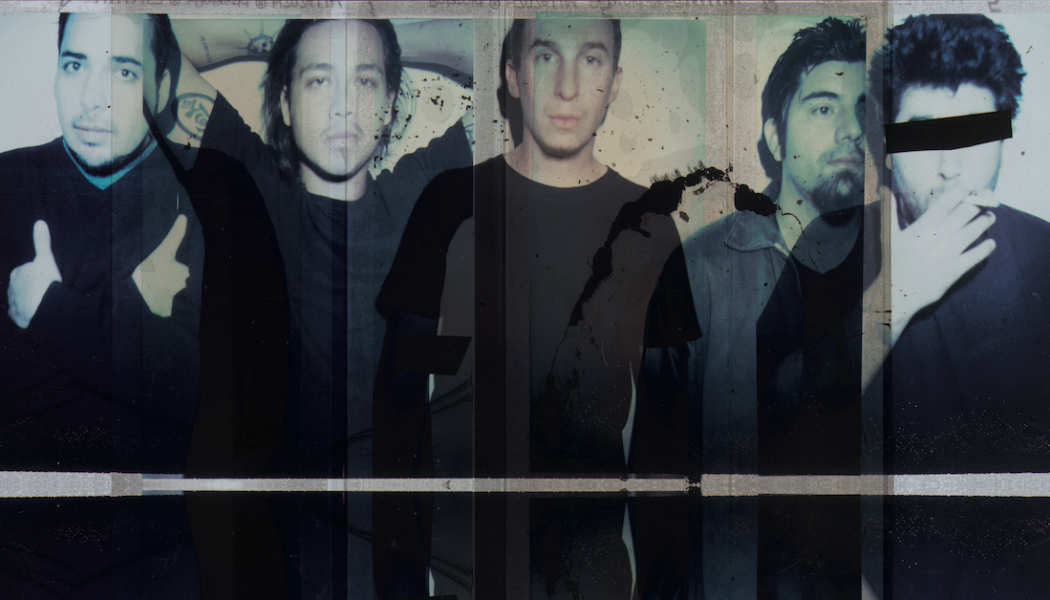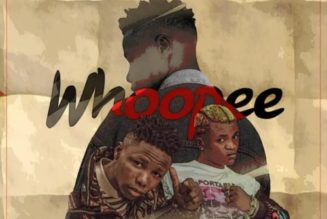
Though it wasn’t so apparent on their 1995 debut album Adrenaline, Deftones screeched onto the scene with an instinct towards perpetual expansion that was practically encoded in the band’s creative DNA. At first, the Deftones brand was basically synonymous with the nu metal movement the Sacramento, California, outfit seemed to fit so well. By 1997’s sophomore effort Around the Fur, it was clear that Deftones were straining against the stylistic confines they’d initially seemed comfortable working within. The hip-hop, groove metal, and thrashy influences were still there, but the music was now undergirded by an emphasis on dynamics, mood, and atmosphere.
But when the band released its third album, White Pony, six months into the new millennium (June 20th, 2000), Deftones effectively rendered themselves uncategorizable. Genre tags like nu metal, alt metal and just plain metal were no longer sufficient to encompass what the album offered — even though much of its lumbering attack and chunky detuned riffing still checked the boxes for what we think of when we use those terms. The first Deftones album to incorporate DJ/keyboardist Frank Delgado as a full-time member, as well as the first album to feature frontman Chino Moreno’s guitar work, White Pony marks the point where the band incorporated space in (quite literally) a big way.
Simultaneously dense and airy, White Pony captures the band growing into the most fully realized vision of what its sound could be, at least up until that point. And there are myriad reasons why, 20 years later, we might argue that White Pony has aged far more gracefully than works from the same period by the band’s then-contemporaries. In fact, because of its oddball infusion of influences — including shoegaze, ambient textures, glitch, post-hardcore, etc., etc. — White Pony has aged to the point where one can listen to it completely outside the context of the trends it both represented and broke from. In other words, it’s easier to look back now and recognize what a unique work of art White Pony really is.
In an online press conference held a few days prior to the 20th anniversary of the album’s release, Moreno, Delgado, and drummer Abe Cunningham reminisced for an hour and a half about what their intentions were at the time. According to Delgado, who had come onboard in earnest just in time for the Around the Fur touring cycle, the band came up with the logo design and shared a collective mental picture of the record—even going so far as to approach DJ Shadow about doing a remix version of the album before White Pony even came out. Delgado stressed, however, that they weren’t off-base in their sense that they were onto something. Though it started out as little more than an intuitive feeling, White Pony established its relationship with the band in a way that was quite tangible to them.
Not to mention that the band’s goals were quite defined as Moreno, Cunningham, Delgado, guitarist Stephen Carpenter and late bassist Chi Cheng set out to record with producer Terry Date for the third time in a row — even though they only had about half the songs written by then. This time, they gathered at The Plant, a storied Sausalito recording studio that impressed Cunningham for the slew of classic albums recorded there, including Stevie Wonder’s Songs in the Key of Life and Fleetwood Mac’s Rumours.
“Going in to write this record,” Moreno offered, “it wasn’t [about] what type of songs we wanted to make or what we wanted to write about. It was more about how we really wanted to expand on the sound. Once we started getting the tones — hearing the space, hearing the songs open up and sort of trail-out and not be so compacted and adding Frank’s soundscapes as well — all of that helped inspire the songwriting itself. That lent itself to us exploring and seeing how far we could take it.”
“We trusted each other,” Cunningham added. “There was a lot of trust between us at the time. Everyone was on the same wavelength as far as experimentation.”
Initially, as Moreno explained, he only played guitar on sketch recordings of song ideas. It was actually at Carpenter’s insistence that Moreno actually tracked the guitar parts he’d come up with, a challenge for both Moreno and the rest of the band for which to make room. Ironically enough, it wasn’t long before friction ensued between Carpenter and Moreno over guitar arrangements — although Moreno was quick to correct the common misconception that the push-pull between them boiled down to Carpenter pushing for a heavier sound while Moreno pushed in the opposite direction. Carpenter, Moreno stressed, brought just as broad a range of influences to the table as he did, and Carpenter’s playing on White Pony is by no means confined to just “heavy riffs.”
It was even more challenging to find a way to work in Delgado’s unorthodox, textural style of DJing — arguably the element that set Deftones completely apart. From the opening of “Digital Bath”, a watershed moment in the recording process where a Delgado sound effect hovers like a ghostly presence over Cunningham’s reverb soaked kick and snare drums, Deftones announced in dramatic fashion that they’d cracked their sound open and hollowed it out in a way that would have seemed inconceivable five years prior.
“For me,” Delgado recalled, “it was honestly always a learning process trying to find where I fit, especially within songs that were already done. I kinda got used to coming from behind and adding to things. By the time White Pony was being written, I was a lot more in the forefront at the idea stage. It wouldn’t always necessarily become a song, but it would spark things. But yeah, I’m still trying to figure out how to find space. And I was just trying to do everything possible to sound like a synthesizer or a sampler because I didn’t have one.”
As much as the band may have had to work to accommodate the additional instrumentation, all of the elements gel seamlessly on tracks like “Korea”, “Rx Queen”, the Maynard James Keenan guest feature “Passenger”, and the surprise alt-rock radio hit “Change (In the House of Flies)” — all of which sound as haunted as they are “heavy.” Indeed, if there’s one word that sums White Pony up, it’s “growth,” which is most strikingly exemplified by “Teenager”, an almost complete departure that can perhaps be described as a sublimely melodic trip-hop ballad that captures the out-of-body sensation of having a crush on someone. Somehow, the song (which started out as an idea for Moreno’s electro-experimental side project Team Sleep) fits — and maybe even anchors — the arc of the track sequence.
Editors’ Picks
Notably, the official track sequence of the album that’s most available today (via streaming platforms as well as the most recent version pressed in physical formats) isn’t the one the band intended. The record label appended the song “Back to School (Mini Maggit)” to the front of the sequence, an unforgivable decision that totally throws-off the flow. The good news: the band announced at the press conference that the upcoming anniversary reissue will restore the album to its original form, with the pummeling stutter-stop groove of “Feitceira” properly kicking things off. In addition, the remix idea that Moreno and Delgado originally proposed to DJ Shadow is finally coming to fruition as a bonus disc titled “Black Stallion”, which will feature Shadow and artists reworking the original White Pony tracks.
Over the years, Moreno has been quite open about the ways in which drugs inspired the often disturbing imagery on White Pony (the title itself is, at least on one level, a reference to cocaine) — a narcotic-fueled affair that surges with powerful, even violent emotions, White Pony is also strangely buoyed by its romantic undercurrents. For a band that hit so hard, their touch was also quite deliberate, and it’s clear that White Pony aspires to a kind of sonic poetry.
Before the claustrophobic gloom that seeped into the next two albums, Deftones allowed themselves to soar above their limitations with stars in their eyes. For all its volatility, White Pony remains a giddy experience, a document of a band on its way up the mountain and intoxicated by a sense of joy in artistic triumph — one of many reasons that White Pony still delivers such potent highs this long after its release.










